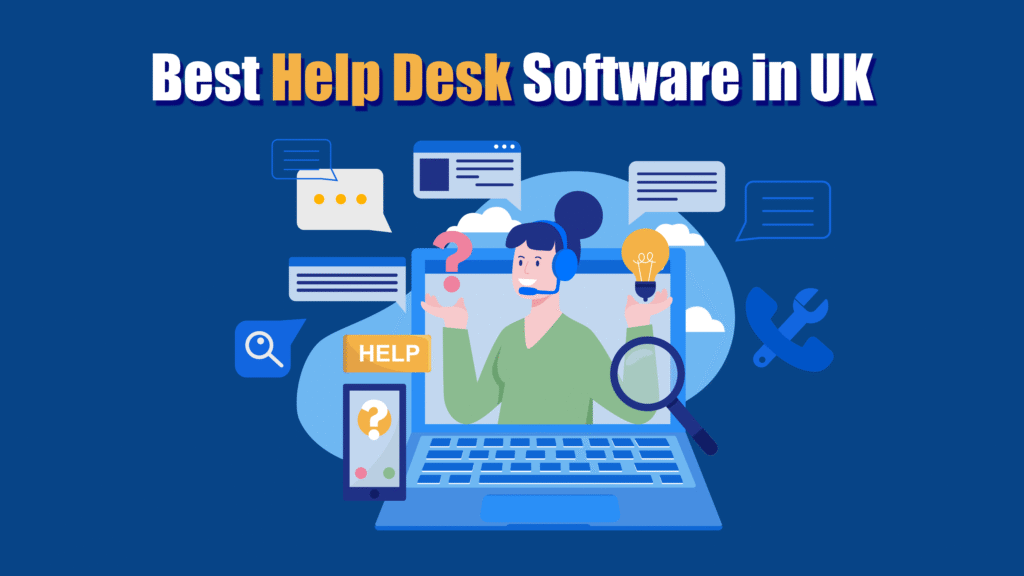In today’s highly connected and customer-centric business environment, providing responsive and reliable support is no longer optional—it’s essential. As organisations across the UK move toward hybrid and remote models, help desk software has become a critical tool for ensuring timely communication, customer satisfaction, and streamlined internal operations. Whether you’re dealing with customer queries, IT incidents, or internal service requests, the right help desk platform can help you manage it all in one place.
The help desk software market in 2026 is more advanced and competitive than ever. Platforms now offer AI-powered ticket routing, omnichannel support, self-service knowledge bases, automated SLAs, and real-time analytics. UK businesses of all sizes—from startups to multinational enterprises—rely on these tools to track tickets, prioritise requests, improve agent efficiency, and offer customers 24/7 multichannel support through email, live chat, phone, and social platforms.
This guide features the Top 15 Best Help Desk Software in the UK in 2026, carefully selected based on functionality, innovation, ease of use, scalability, compliance with UK regulations (like GDPR), and real user feedback. Whether you’re a startup looking for simplicity or a complex enterprise needing ITSM-grade features, this list has the perfect solution for your support needs.
Top 15 Help Desk Software in UK in 2026
Below is a quick overview of the top-rated help desk platforms, each offering unique strengths for different team sizes, industries, and service models:
- Freshdesk – AI-powered omnichannel support for businesses of all sizes.
- Zendesk – Enterprise-grade customer support with advanced automation.
- Zoho Desk – Affordable and scalable solution for CRM-integrated service.
- Jira Service Management – Best for IT support and internal service teams.
- HubSpot Service Hub – Unified help desk and CRM in one easy-to-use tool.
- LiveAgent – Real-time live chat and multichannel ticketing at a great value.
- Help Scout– Clean, simple customer support tool with built-in docs.
- ServiceNow – Enterprise ITSM platform with deep automation and analytics.
- ManageEngine ServiceDesk Plus – Robust internal help desk for IT teams.
- Gorgias – Ecommerce-focused help desk with deep Shopify integration.
- Kayako – Personalised customer service through a unified inbox.
- HappyFox – Intuitive and fast with strong automation for mid-sized teams.
- SysAid – Customisable IT help desk with asset and change management.
- Front – Shared inbox and collaboration tool for support-driven teams.
- Vision Helpdesk – Versatile solution for ITIL-aligned service and satellite desks.
How This Top 15 List Was Compiled
To create this list of the best help desk software for UK businesses in 2026, we used a rigorous evaluation process, combining product research, hands-on testing, and verified user feedback. Here’s what we prioritised:
- Omnichannel Ticketing: Platforms had to support requests from multiple sources like email, phone, chat, and social media.
- Automation & AI: Intelligent workflows, auto-routing, chatbots, and SLA tracking were key ranking factors.
- Ease of Use: We evaluated the simplicity of setup, agent training, and everyday usability.
- Customisation & Integration: The ability to adapt workflows and integrate with tools like CRMs, project management apps, and cloud platforms was essential.
- Scalability: We ensured the tools could serve small teams as well as large organisations across multiple locations.
- Data Security & GDPR Compliance: All tools had to meet UK data privacy regulations.
- Customer Satisfaction: We analysed reviews from UK-based users across G2, Trustpilot, Capterra, and user communities.
Using these criteria, we curated a shortlist that includes both flexible platforms for startups and robust ITSM tools for large enterprises.
Pricing Breakdown by Business Type
Help Desk Software for Small Teams and Startups
Small UK businesses and startups typically seek intuitive, low-cost help desk software that supports core functionality like email ticketing, shared inboxes, basic reporting, and live chat—without needing dedicated IT support. Many top tools offer free plans or pay-as-you-grow pricing models.
Recommended tools for small teams:
- Freshdesk (Free plan with multichannel support)
- Zoho Desk (Affordable entry-tier with automation)
- Help Scout (Simple UI and built-in docs)
- HubSpot Service Hub (Free CRM integration)
- LiveAgent (Budget-friendly with real-time chat)
These tools focus on speed, simplicity, and low overhead, making them ideal for lean support teams that still want professionalism and scalability.
Help Desk Software for Growing Businesses
As teams grow and customer volumes increase, businesses need smarter tools with built-in workflows, self-service portals, analytics, and role-based permissions. Integration with CRMs, analytics tools, and collaboration apps becomes essential.
Top picks for growing businesses:
- Zendesk (Powerful workflows and multichannel support)
- Zoho Desk (AI, multichannel, and CRM integration)
- Help Scout (Simple team collaboration and shared inboxes)
- HappyFox (Mid-tier automation and analytics)
- Vision Helpdesk (Multi-brand and remote team support)
These tools support both external customer service and internal support with increased efficiency and transparency.
Enterprise-Grade Help Desk Software for Large Organisations
Enterprises operating across regions and departments require highly customisable help desk platforms with ITIL compliance, AI insights, audit trails, and deep automation. These systems are typically part of broader ITSM or ERP ecosystems.
Top enterprise-ready solutions:
- ServiceNow (Advanced ITSM and workflow automation)
- Jira Service Management (ITIL-aligned and DevOps-ready)
- ManageEngine ServiceDesk Plus (Robust internal help desk)
- SysAid (Asset tracking, ticketing, and self-service)
- Gorgias (Ecommerce-focused with deep integration and macros)
These platforms are built to reduce operational silos and help large UK teams deliver fast, compliant, and measurable service across departments.
1. Freshdesk
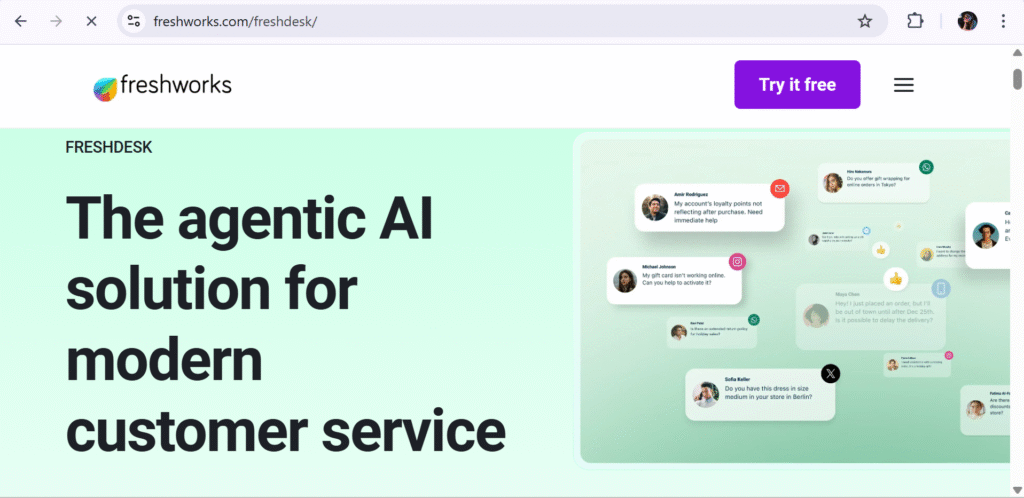
Overview
Freshdesk by Freshworks is a widely trusted, AI-powered help desk software designed for businesses of all sizes. Its user-friendly interface, flexible pricing, and strong omnichannel support make it especially popular among UK startups, mid-sized companies, and remote teams. From email to chat, phone, and social media, Freshdesk consolidates every customer interaction into a unified dashboard for easy management.
Features
- Omnichannel ticketing (email, phone, chat, social media, website)
- AI assistant “Freddy” for auto-responses and ticket suggestions
- SLA and escalation management
- Knowledge base and self-service portal
- Time tracking and agent performance reporting
- 100+ integrations (Slack, Shopify, CRM platforms, etc.)
Review
Users across the UK consistently praise Freshdesk for its intuitive interface, strong automation features, and fast implementation. The built-in AI tools help reduce manual work for agents, while the mobile app keeps remote teams connected and productive.
Pros
- Free plan available for small teams
- AI-driven ticket routing and resolution
- Seamless multichannel support
- Excellent user interface
- Quick setup and scalability
Cons
- Limited workflow customisation in lower-tier plans
- Some advanced reports require higher-tier subscription
Final Verdict
Freshdesk is a powerful, budget-friendly help desk platform ideal for UK businesses seeking automation, multichannel capabilities, and a fast learning curve—all while staying GDPR-compliant.
2. Zendesk
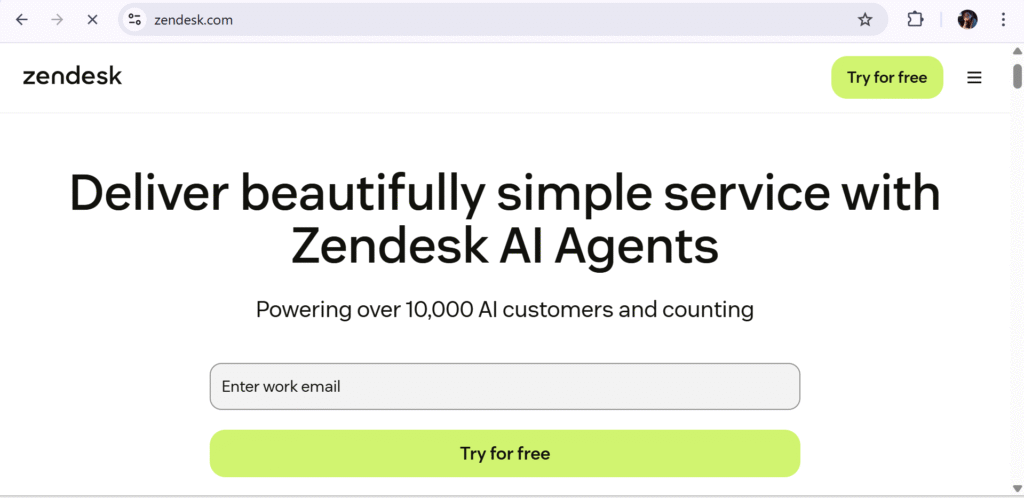
Overview
Zendesk is a leading enterprise-grade help desk solution designed for companies with complex customer support needs. Known for its powerful automation, deep integrations, and extensive configuration options, Zendesk is trusted by high-volume support teams across finance, ecommerce, public services, and more throughout the UK.
Features
- Multichannel ticket management (email, live chat, social, voice)
- Workflow automation with triggers and macros
- Customisable SLA policies and reporting dashboards
- AI tools for ticket classification and bot responses
- Help centre and knowledge base builder
- Integration with Salesforce, Jira, Slack, Shopify, and more
Review
Zendesk is frequently praised for its professional appearance, robust infrastructure, and feature flexibility. UK users appreciate the range of integrations and the analytics tools, though some find the learning curve steep for first-time users or small teams.
Pros
- Powerful automation and workflows
- Sleek, professional user interface
- Highly customisable and scalable
- Enterprise-grade integrations
- Reliable GDPR-compliant infrastructure
Cons
- Expensive for small businesses
- Can be complex to configure initially
Final Verdict
Zendesk is ideal for large UK organisations or growing companies with high support volumes that require a flexible, enterprise-level help desk solution with excellent reporting and omnichannel support
3. Zoho Desk
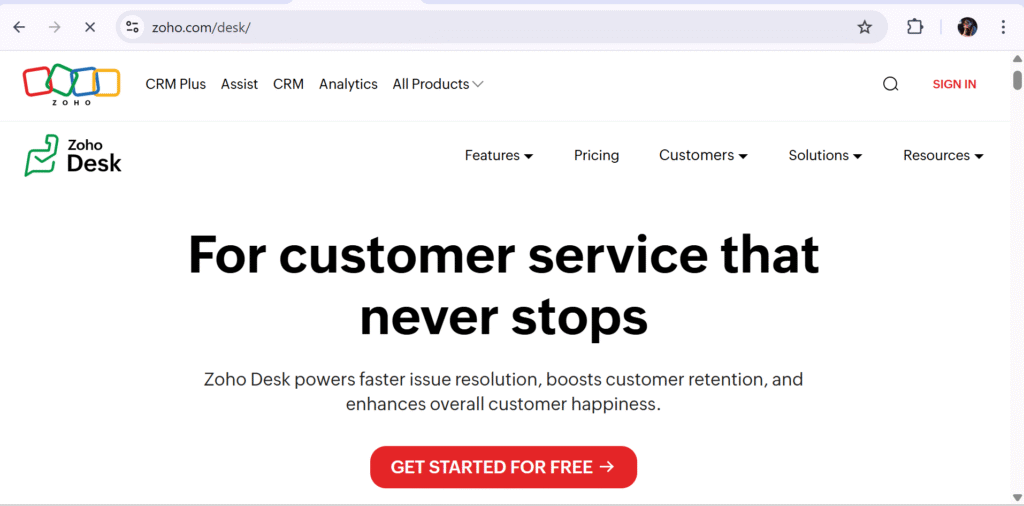
Overview
Zoho Desk is an affordable, AI-powered help desk solution that’s especially popular among UK small businesses and mid-sized enterprises. Part of the Zoho ecosystem, it offers seamless integration with Zoho CRM, Books, and other productivity tools, making it a go-to option for teams that value cost-efficiency and smart automation.
Features
- Multichannel support (email, chat, social media)
- AI assistant (Zia) for sentiment analysis and suggestions
- SLA tracking and ticket assignment automation
- Customer self-service portal and knowledge base
- Time tracking and agent productivity metrics
- Deep integration with Zoho apps and third-party CRMs
Review
Zoho Desk earns high marks for being cost-effective, easy to deploy, and loaded with smart features. UK businesses especially value its tight CRM integration, making it easier to manage customer history, automate workflows, and respond faster.
Pros
- Excellent value for money
- Smart AI and automation for support teams
- Deep native CRM and finance tool integration
- Customisable SLAs and dashboards
- Easy onboarding for teams of any size
Cons
- Limited advanced features on lower plans
- Third-party integrations less extensive outside Zoho ecosystem
Final Verdict
Zoho Desk is a top contender for UK-based SMEs that want affordable, feature-rich support software with excellent CRM integration and built-in AI.
4. Jira Service Management
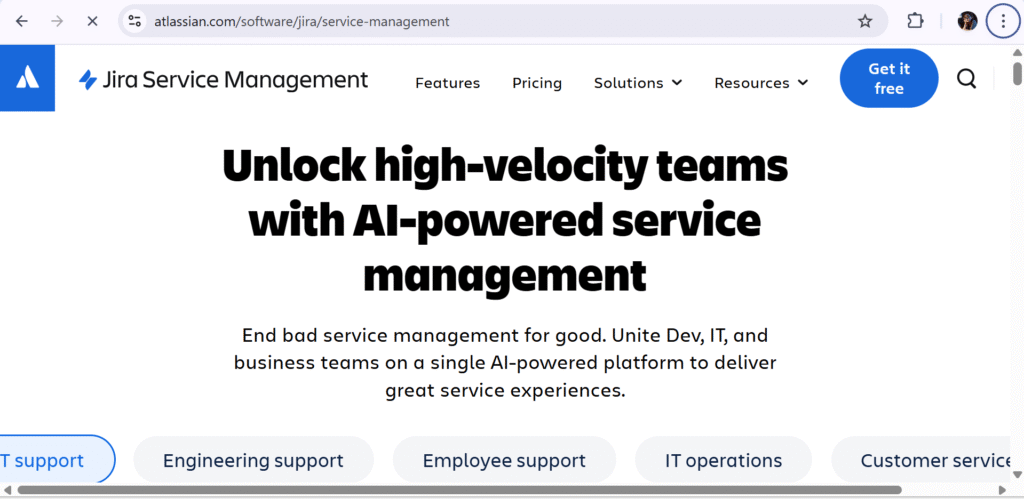
Overview
Jira Service Management, developed by Atlassian, is a powerful help desk and ITSM platform designed for technical and internal support teams. It’s widely used across the UK by IT departments, managed service providers, and software companies. Its deep integration with Jira Software makes it ideal for teams that follow Agile or DevOps workflows.
Features
- ITIL-compliant ticketing for incidents, problems, and change management
- Dynamic request forms and service portals
- SLA metrics, approval workflows, and automation
- CMDB and asset management integration
- Custom queues, filters, and priority settings
- Native integrations with Confluence, Jira Software, Bitbucket
Review
UK IT teams rely on Jira Service Management for its flexibility, collaboration tools, and security. Though it’s highly technical and best for internal service desks, users appreciate its ability to unify DevOps, engineering, and support into a single workspace.
Pros
- Purpose-built for IT and technical teams
- ITIL-ready with change and asset management
- Scalable across departments (HR, Finance, Ops)
- Integrates deeply with Atlassian products
- Highly customisable workflows and SLAs
Cons
- Learning curve for non-technical users
- Less suited for customer-facing support without add-ons
Final Verdict
Jira Service Management is the ideal help desk software for UK businesses running IT support or internal service operations. It’s a powerhouse for DevOps collaboration and workflow control.
5. HubSpot Service Hub
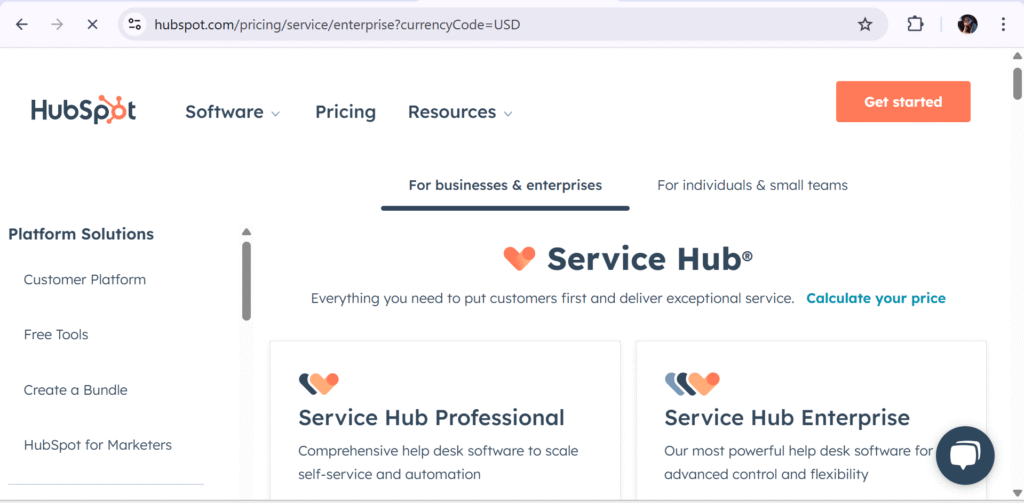
Overview
HubSpot Service Hub brings help desk functionality into HubSpot’s popular CRM platform, giving UK businesses a centralised way to manage customer support, track interactions, and improve service delivery. Its unified interface helps agents collaborate easily, while its free plan makes it accessible for startups.
Features
- Ticket pipelines and team inbox
- Customer feedback tools (NPS, CSAT)
- Live chat and chatbot integration
- Knowledge base creation and publishing
- SLA automation and reporting dashboards
- Native CRM integration with marketing and sales tools
Review
UK users appreciate HubSpot Service Hub’s ease of use, clean UI, and seamless connection to sales and marketing. It’s particularly valuable for companies wanting to combine support with customer lifecycle insights—all in one platform.
Pros
- Unified CRM and help desk experience
- Easy to set up and use
- Free tier available
- Marketing, sales, and support tools in one place
- GDPR-compliant with EU-hosted data
Cons
- Fewer advanced support features on free plan
- Limited configuration options vs. enterprise tools
Final Verdict
HubSpot Service Hub is perfect for UK startups and SMEs looking to centralise support and CRM under one clean, scalable, and budget-friendly interface.
6. LiveAgent
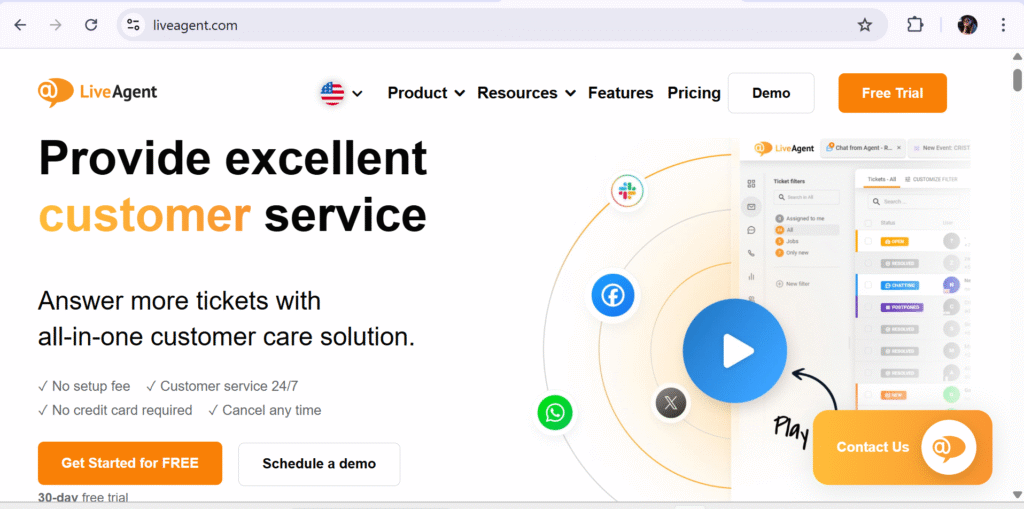
Overview
LiveAgent is a feature-rich, real-time help desk solution built for companies that want fast, multi-channel support at a competitive price. Especially popular among UK-based ecommerce, telecom, and SaaS businesses, LiveAgent offers live chat, ticketing, and a call centre system all in one platform. With no-frills pricing and a fast interface, it’s great for businesses that want power without complexity.
Features
- Unified inbox for email, chat, social, calls, and forms
- Live chat with real-time visitor monitoring
- Built-in call centre with IVR and call routing
- Customer portal and knowledge base
- Gamification tools for support teams
- 200+ integrations (including Shopify, Slack, and WhatsApp)
Review
UK users praise LiveAgent for offering enterprise-like features at an SMB-friendly price point. Its real-time capabilities, especially chat and call routing, are seen as game-changers for teams dealing with time-sensitive queries.
Pros
- One of the most affordable multichannel solutions
- Built-in call support
- Real-time performance metrics
- Clean, fast UI with minimal learning curve
- Customisable ticket fields and agent workflows
Cons
- Interface feels slightly dated in parts
- Some automation features are basic
- Free version is limited in scope
Final Verdict
LiveAgent is an ideal help desk platform for UK SMEs that need responsive multichannel support—including voice and live chat—without breaking the budget.
7. Help Scout
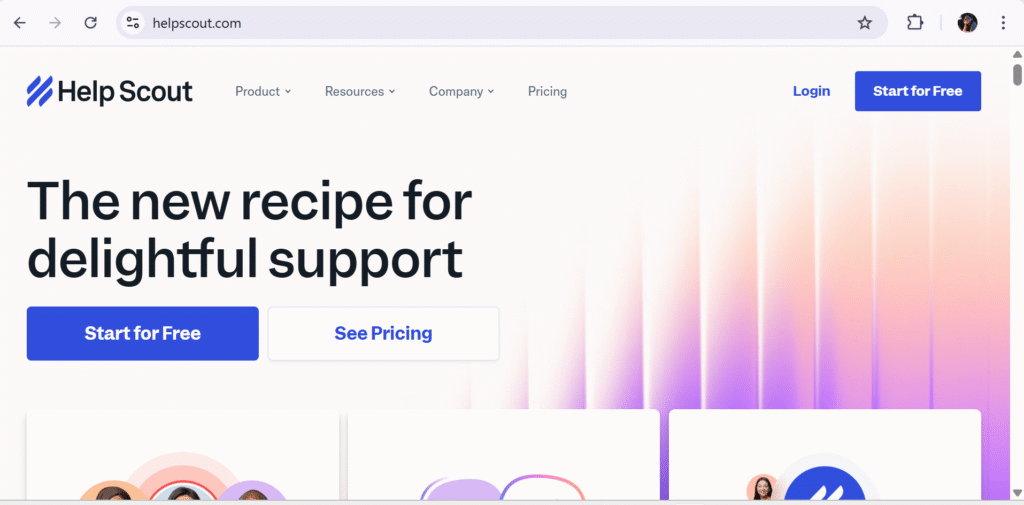
Overview
Help Scout is a customer-first help desk solution that blends simplicity, speed, and collaboration. Especially useful for UK startups, nonprofits, and customer-centric brands, it offers shared inboxes, help centres, and light automation in a clean, conversational interface. Unlike many other tools, Help Scout focuses on creating a personal, email-like experience for every support request.
Features
- Shared inboxes with collision detection
- Knowledge base with search analytics
- Customer profiles and previous conversations
- In-app messaging and Beacon widget
- Reporting dashboards for teams
- Integrations with HubSpot, Salesforce, Slack, and more
Review
UK-based users love the minimalism of Help Scout—it’s designed for speed and ease rather than bloated features. Teams say they can get started in hours, not days, and the platform is ideal for maintaining personalised responses with a small team.
Pros
- Clean, email-like UI
- Great for small to mid-sized customer service teams
- Easy to train staff
- Strong self-service options
- Works well with remote teams
Cons
- Not ideal for large ticket volumes or IT use cases
- Lacks built-in live chat routing intelligence
- Limited on advanced automation
Final Verdict
Help Scout is best suited for UK companies that value simplicity, fast deployment, and a personal touch in their customer support—especially for teams focused on email and in-app help.
8. ServiceNow
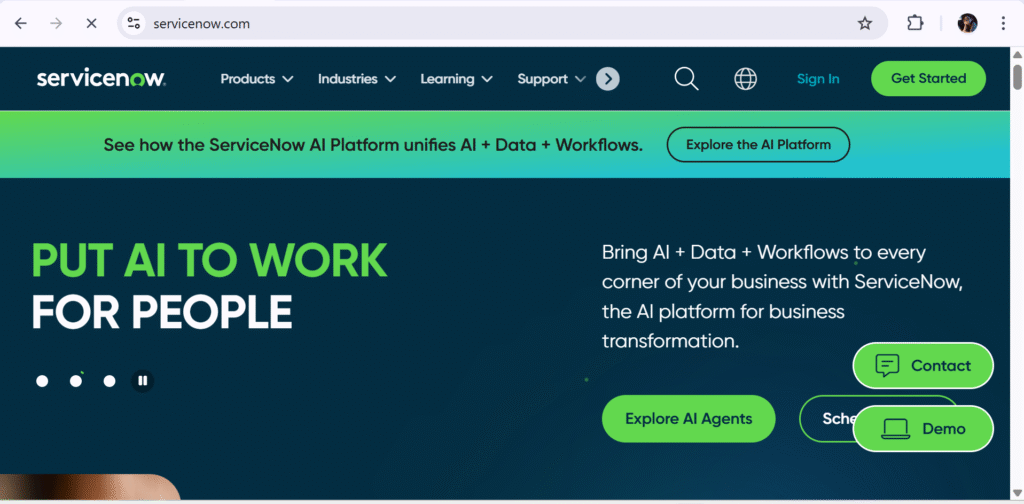
Overview
ServiceNow is an enterprise-grade platform offering a full ITSM suite that includes help desk ticketing, incident management, automation, and powerful analytics. It’s trusted by large UK corporations, healthcare providers, and public sector organisations due to its deep customisation, scalability, and security compliance. ServiceNow isn’t just a help desk—it’s a digital workflow powerhouse.
Features
- Incident, request, change, and asset management
- AI-powered virtual agents and predictive intelligence
- Custom workflows and business rules
- Advanced reporting and analytics
- ITIL-aligned service catalogues
- Integrations with Microsoft 365, Azure, and Salesforce
Review
ServiceNow receives high marks for enterprise support and IT service workflows. UK clients appreciate the platform’s flexibility in building service portals for HR, legal, finance, and facilities—not just IT. However, the setup process requires technical knowledge and onboarding support.
Pros
- Extremely powerful and customisable
- Enterprise-grade compliance and security
- Can support multiple departments beyond IT
- Deep analytics and reporting
- Trusted by major UK institutions
Cons
- Requires a significant learning curve
- Expensive and resource-intensive
- Setup best done with a certified partner
Final Verdict
ServiceNow is ideal for large UK organisations needing a highly configurable, enterprise-grade help desk that can support IT, HR, and operations at scale.
9. ManageEngine ServiceDesk Plus
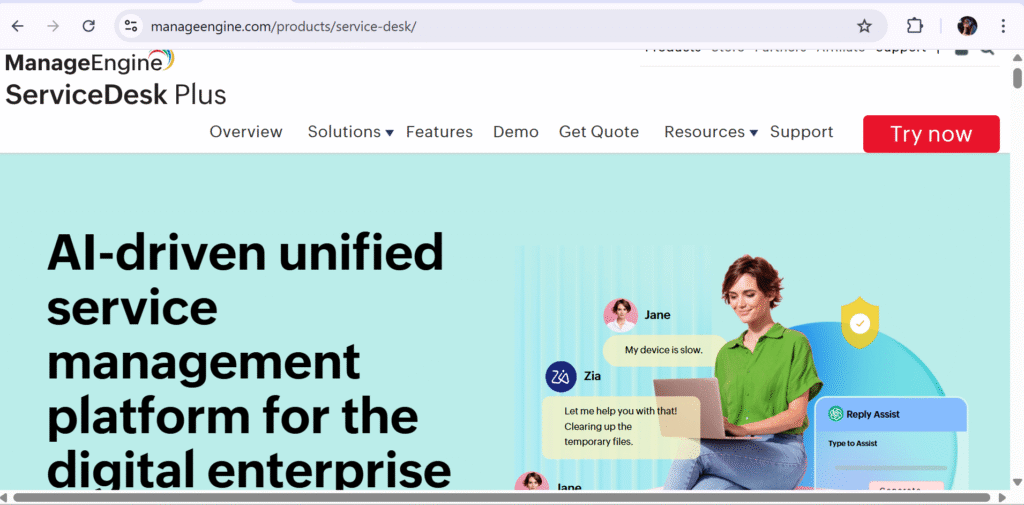
Overview
ManageEngine ServiceDesk Plus is an IT help desk software platform with strong ITSM capabilities, designed for internal service teams and IT departments. Widely used across UK schools, government offices, and mid-market enterprises, it combines incident tracking, asset management, and automation within a secure environment.
Features
- Incident, problem, and change management
- Asset and inventory tracking
- Workflow automation and SLA alerts
- Service catalogue and user portal
- Customisable dashboards and reports
- Integration with Microsoft tools, Active Directory, and more
Review
UK users favour ManageEngine for internal ticketing workflows and asset management. Its on-premise and cloud versions give flexibility, and the platform balances functionality with cost efficiency. Setup may take time but pays off in long-term value.
Pros
- Great for IT and internal teams
- Affordable for mid-sized organisations
- Detailed asset tracking
- Offers both cloud and on-premise versions
- Strong compliance and security tools
Cons
- Less suitable for customer-facing support
- Interface is more functional than modern
- Requires admin time to customise fully
Final Verdict
ManageEngine ServiceDesk Plus is perfect for UK-based IT teams and public organisations needing a cost-effective, full-featured help desk with asset management capabilities.
10. Gorgias
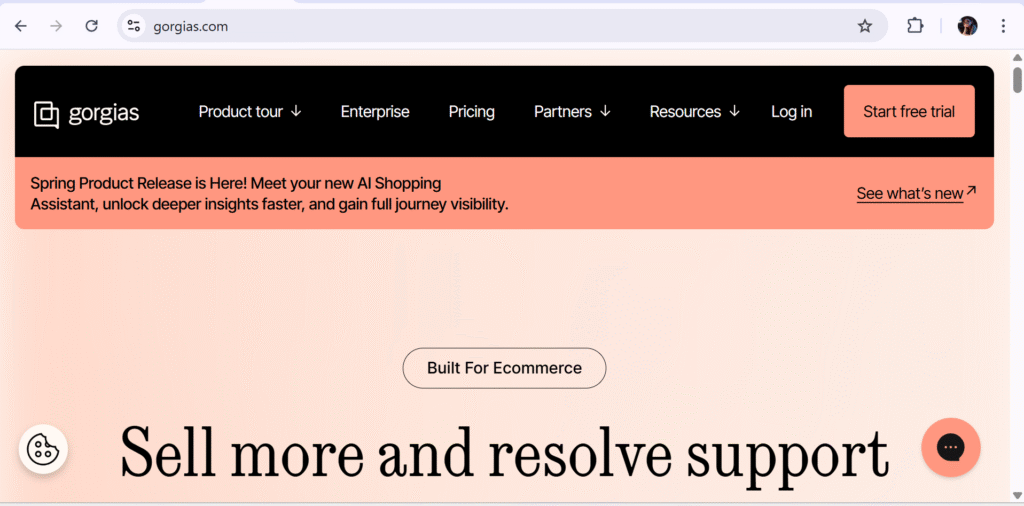
Overview
Gorgias is a help desk tool built specifically for ecommerce businesses. Popular among UK Shopify, BigCommerce, and Magento store owners, it centralises customer queries across channels and integrates directly with ecommerce platforms. Agents can view order history, issue refunds, and edit orders directly within the help desk—no tab switching needed.
Features
- Multi-channel support (email, chat, social, SMS)
- Macros and automation for common responses
- Shopify/BigCommerce/Magento integrations
- Custom views and team performance metrics
- One-click actions for refunds and order edits
- AI-suggested replies and tagging
Review
UK-based ecommerce teams love Gorgias for its deep integration with store platforms. The ability to see real-time customer data, order history, and initiate transactions from the support screen significantly boosts efficiency and customer satisfaction.
Pros
- Built specifically for ecommerce
- Deep integrations with Shopify and BigCommerce
- Reduces handling time with macros and automation
- Excellent UI and easy navigation
- Fast setup for retail teams
Cons
- Not ideal for non-ecommerce businesses
- Can get pricey as ticket volume increases
- Lacks complex ITSM tools
Final Verdict
Gorgias is a perfect fit for UK ecommerce brands that want to deliver fast, personal support while having full visibility into customer and order data from a single screen.
11. Kayako
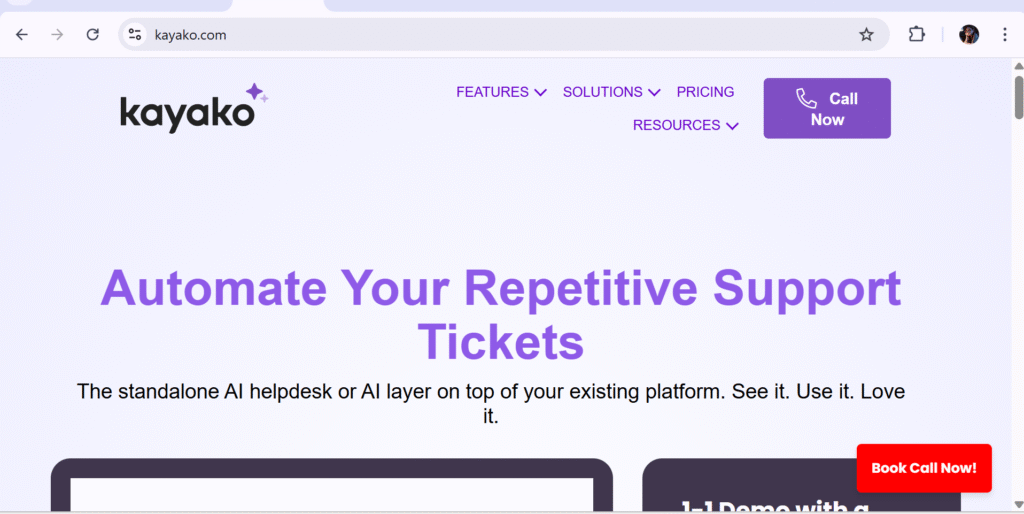
Overview
Kayako is a unified customer service platform that offers shared inboxes, real-time messaging, and multichannel ticketing with a strong focus on delivering personalised support. It’s used by UK businesses that want a simple, no-fuss tool with an emphasis on improving customer conversations. Kayako is well-suited for mid-sized support teams and B2C brands that rely heavily on email and chat.
Features
- Unified inbox for email, chat, social, and web
- Real-time messaging and conversation tracking
- Help centre and knowledge base tools
- SLA management and customer journey insights
- Customer timelines with historical activity
- Integration with Salesforce, Slack, Zapier, and more
Review
UK users find Kayako to be clean and intuitive, especially for teams dealing with inbound queries across email and social media. Its customer journey view is unique and helps agents better understand context before responding.
Pros
- Easy to set up and manage
- Focused on personalising customer interactions
- Strong email and chat handling
- Visual timeline of each customer’s journey
- Clean and modern user interface
Cons
- Limited ITSM capabilities
- No built-in call centre or VoIP support
- Reporting features less advanced than competitors
Final Verdict
Kayako is a strong choice for UK businesses that want an elegant, conversation-focused help desk platform with strong multichannel messaging tools.
12. HappyFox
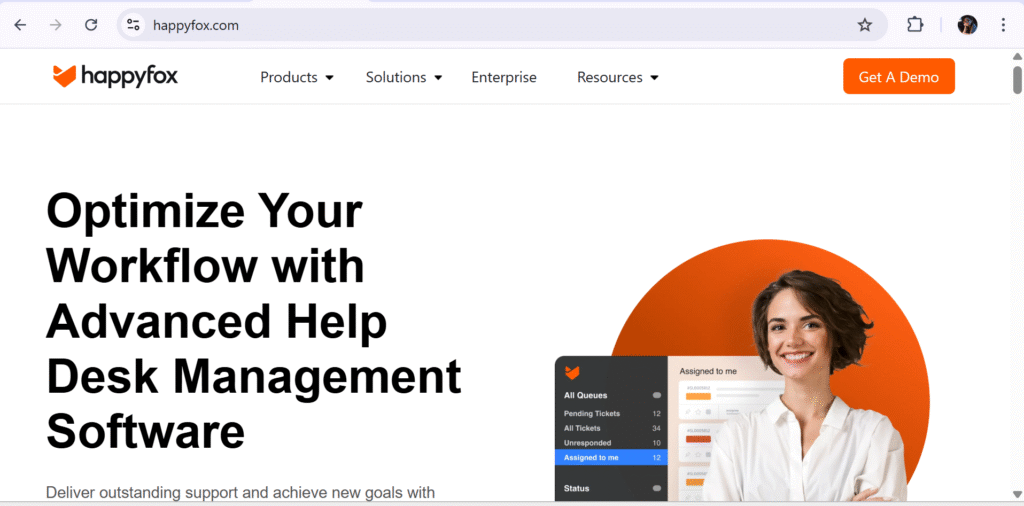
Overview
HappyFox is a cloud-based help desk and customer support platform built for mid-sized businesses that want a robust ticketing system combined with automation and self-service tools. Known for its sleek interface and customisable workflows, HappyFox supports both customer service and internal IT ticketing across UK industries including healthcare, finance, and retail.
Features
- Smart ticketing and auto-assignment rules
- Multi-brand support with separate portals
- SLA management and escalation triggers
- Knowledge base and community forums
- Task management for support teams
- Integration with FreshBooks, Microsoft Teams, and Google Workspace
Review
UK users praise HappyFox for its balance of simplicity and power. It provides solid automation and flexibility without the bulk of an enterprise system. Many appreciate its fast performance and responsive customer support team.
Pros
- Strong automation and custom workflows
- Clean, responsive interface
- Excellent for managing multiple brands
- Solid reporting and dashboard features
- Reliable cloud uptime
Cons
- No free plan
- Pricing may be high for small teams
- Limited native ecommerce integrations
Final Verdict
HappyFox is a premium, mid-tier help desk solution perfect for UK companies looking for flexible automation, multi-brand support, and fast customer response handling.
13. SysAid
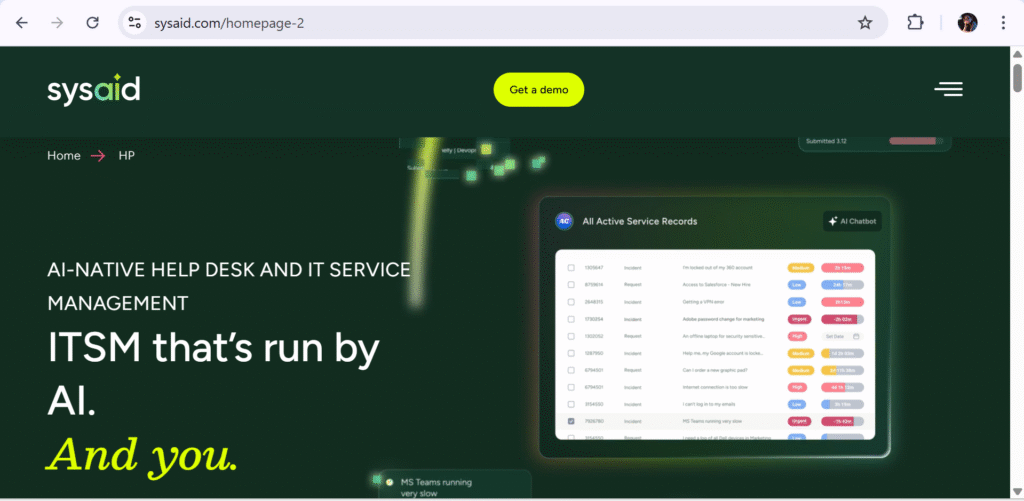
Overview
SysAid is an all-in-one IT service management platform with built-in help desk, asset management, remote control, and patch management tools. Tailored for internal IT departments and public sector organisations in the UK, SysAid supports both cloud and on-premise deployment and excels in centralising service operations under one dashboard.
Features
- ITIL-aligned incident and change management
- Asset and software inventory management
- Remote desktop access and control
- Workflow automation with custom forms
- Self-service portal and knowledge base
- LDAP and Active Directory integrations
Review
SysAid receives solid reviews from UK IT administrators for consolidating help desk, device management, and IT tasks in one platform. It’s especially valued by universities, government bodies, and mid-size enterprises.
Pros
- Great for IT teams and internal ticketing
- Full asset and remote device management
- Flexible deployment (on-premise or cloud)
- GDPR-compliant with custom privacy settings
- High customisation for process automation
Cons
- UI feels less modern compared to newer tools
- Requires time to set up and configure
- More IT-focused, not ideal for customer support
Final Verdict
SysAid is a robust IT help desk solution for UK-based organisations that require full control over internal services, assets, and infrastructure with strong security.
14. Front
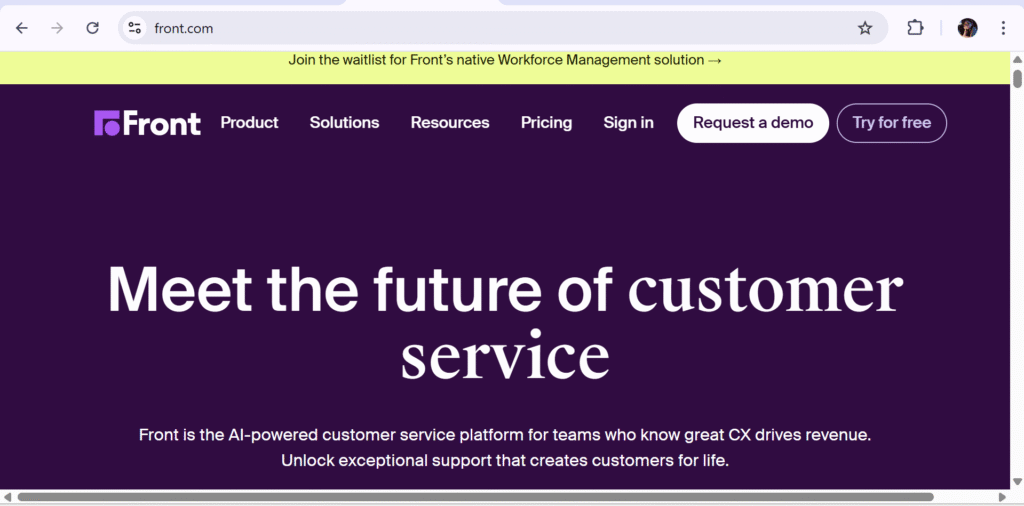
Overview
Front blends the familiarity of an email inbox with help desk features and team collaboration. It’s especially popular among UK-based customer success teams and B2B support organisations that prioritise shared visibility, conversation ownership, and faster internal collaboration. Front is not a traditional ticketing system, but a hybrid tool designed to streamline conversations across teams.
Features
- Shared inboxes with assignments and comments
- Customer profiles and conversation history
- In-app collaboration with mentions and notes
- Automation rules for replies and routing
- Analytics on response time and team performance
- Integrations with Salesforce, Asana, Zapier, and WhatsApp
Review
Front is loved by UK support and sales teams for breaking down silos and improving response times. Users appreciate the familiar email interface and seamless collaboration features that make every customer conversation transparent and accountable.
Pros
- Ideal for teams that rely on shared inboxes
- Enhances internal communication and transparency
- Fast onboarding and clean UX
- Great for support and account management crossover
- Strong Slack-style collaboration features
Cons
- Not designed for ITSM or complex workflows
- No native live chat or phone support
- Can get pricey as seats increase
Final Verdict
Front is the perfect help desk for UK teams looking to manage customer conversations collaboratively via shared inboxes while maintaining accountability and visibility.
15. Vision Helpdesk
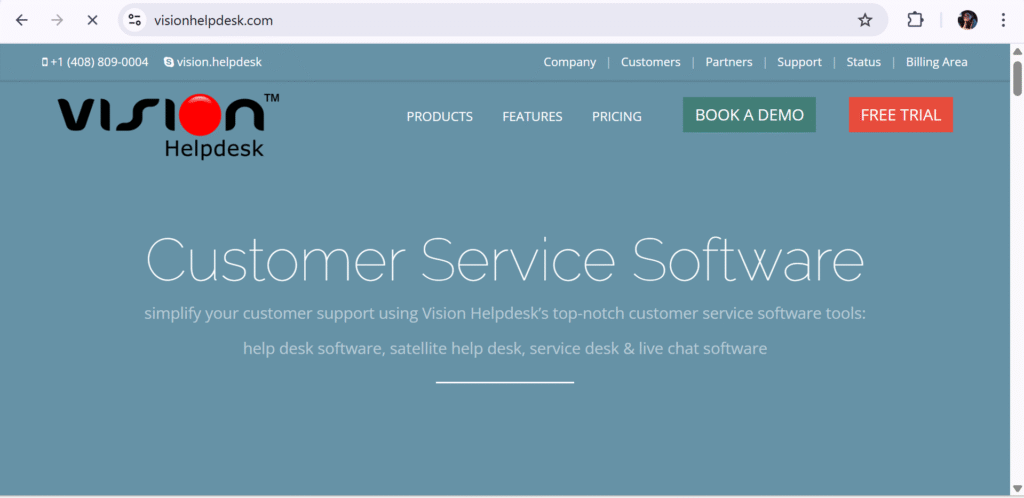
Overview
Vision Helpdesk is a flexible, ITIL-aligned help desk and satellite support platform for businesses managing multiple brands or departments. With modules for ticketing, asset management, billing, and live chat, it’s designed for MSPs, IT teams, and customer service providers needing extensive multi-channel support in the UK.
Features
- Multi-channel ticketing (email, chat, calls, web forms, social)
- Incident, problem, and change management
- Satellite help desk for multi-brand setups
- Gamification and agent performance scoring
- SLA enforcement and escalation matrix
- Billing and time tracking modules
Review
Vision Helpdesk stands out in the UK market for its ability to manage multiple brands or departments under one system. Users appreciate its ITSM features and modular pricing model, especially for outsourced support providers or agencies.
Pros
- Supports ITIL-based service management
- Excellent for MSPs and large service departments
- Affordable modular pricing
- Satellite desk support (multi-company or brand use)
- Asset and billing modules included
Cons
- Slightly dated UI compared to competitors
- Requires technical setup for advanced workflows
- Support documentation could be improved
Final Verdict
Vision Helpdesk is a strong contender for UK MSPs and IT teams managing complex, multi-departmental help desk environments with a focus on compliance and configurability.
